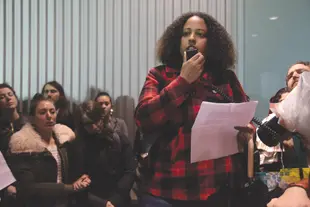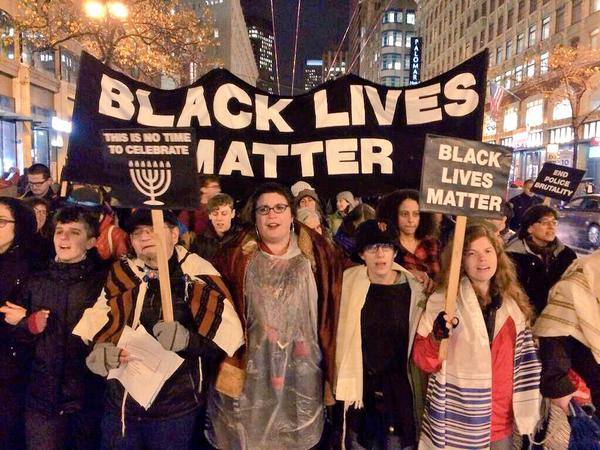“I Am Black, I Am Jewish, and My Life Matters.”
Jan 16, 2015
Posted in Commentary, Community, Equal Rights/Equity, Ferguson/Black Lives Matter

By Kim Carter Martinez
My name is Kim. I am Black, I am Jewish, and my life matters. For the last few months, our country has seen a movement growing from a wave of protests against the police and vigilante law enforcement killings of unarmed Black men.
As a country we have struggled with talking about the issues of police brutality and racism — individual racism, and the systemic and institutionalized racism that Black and Brown people in our country fall victim to on a daily basis.
In America, a black person is killed by the police or by vigilante law enforcement every 28 hours. #BlackLivesMatter, the movement that arose out of the outrage over these killings, describes itself as “an ideological and political intervention in a world where Black lives are systematically and intentionally targeted for demise … [an affirmation of black folks’] contributions to this society, our humanity, and our resilience in the face of deadly oppression.”
Over and over again, I’ve heard people in the Jewish community talk about #BlackLivesMatter as if the violence and racism toward people of color is happening to an outside group we are not a part of.
It’s happening to “them,” and we can only show solidarity to this group in certain ways because it is a group to which we do not belong.

Many Jews post on Facebook or Twitter showing their solidarity for the cause. Some attend rallies and marches to show their solidarity for the cause.
Many talk with their friends and watch comedy television with quasi-political pundits who talk about #BlackLivesMatter.
We do everything we can to align ourselves with the cause and show our solidarity — except at the same time we continue to ignore the fact that, according to several estimates, there are tens of thousands of Black Jewish Americans for whom the issues of police brutality and institutional and systemic racism are an everyday reality.
These are not just Black issues, these are also Jewish issues, and we cannot continue to count them as something separate. Doing so erases the identity of people like me, who are both Black and Jewish.
We are moved by our Jewish teachings of tikkun olam (heal the world) and tzedek, tzedek, tirdof (justice, justice you shall pursue). Yet how can we, as a Jewish people, truly heal the world and pursue justice when we continue to not include Jews of color in leadership roles in our work fighting racism and police brutality in America?
Are we really healing the world and pursuing justice if we ignore the racism that Jews of color have to endure? Organizations must make a concerted outreach effort to Jews of color if they want to have an authentic campaign of solidarity with the issues of all people of color.
Recently I attended a #BlackLivesMatter action in San Francisco, held on the first night of Hanukkah. I was honored to be the emcee, and disappointed to see only a handful of Jews of color among the participants. Why were they left out? Jews of color must be at the forefront of these movements.
I was happy to see J. and other Jewish newspapers carry the story of the Hanukkah action with some prominence. But I also was disappointed to see no quotes or pictures of Jews of color. Why were they left out?
Our stories of racism and discrimination inside and outside the Jewish community must be lifted up and heard. We must welcome Jews of color to tell their stories of racial discrimination in our organized Jewish community, such as synagogues, federations, social groups and Jewish nonprofits. We must not just listen to the stories of racism that Jews of color have endured, we must stand up to it and act, because these are not just Black or Brown issues, they are Jewish issues. And all Jewish people matter.
Kim Carter Martinez is a campaign coordinator for a public employee labor union. She served on the regional council of Bend the Arc and lives in Oakland. This article was reprinted from jweekly.com